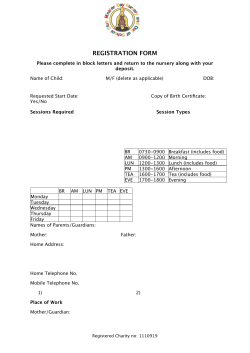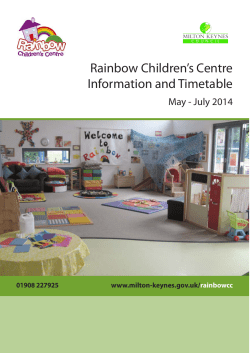
Do you want to work with children? www.portsmouth.gov.uk
Do you want to work with children? A guide to working in early years, childcare and playwork www.portsmouth.gov.uk 2 Contents Introduction Early years and childcare service Why work with children? Who can work with children? Where could I work? Job roles Qualifications Levels of qualifications Who can help? Useful contacts list Introduction This guide will: This guide is for: • describe the range of jobs involving children so you can decide what interests you • anyone considering a career working with children • list the training and qualifications currently available in early years childcare and playwork • people already working in the sector who are seeking further information about career progression • demonstrate how these courses and qualifications relate to various jobs in the sector • employers, careers advisers, schools and colleges There has never been a better time to work in early years and childcare. It’s a growing sector and there is an increasing demand for staff at all levels, which is likely to continue. There are also plenty of opportunities to gain training and qualifications. • inform you of the services available from Portsmouth early years and childcare service If you are looking for a career that’s rewarding, varied, interesting and at times challenging, then working with children could be for you. Whatever role or route you might choose, you can be certain that no two days will be the same, as you support young minds to explore, experience and develop an understanding of the world around them as they grow. 3 4 Early years and childcare service – How we can help you The following services are available from Portsmouth City Council’s early years and childcare service to help you start or progress your career with children. Careers in childcare If you have any questions about careers in childcare or would like information on volunteering, contact the workforce development officer on 023 9268 8833 and they will give you advice or signpost you to the right organisation. Registered childminding The first stage to becoming a childminder is to book on to a briefing session where you will find out about childminding and the registration process. These meetings are held throughout the year. For more information and to book on to a meeting please contact Portsmouth CHAT - family information service on 023 9268 8830. Job vacancy bulletin If you are looking for a job, the early years and childcare job vacancy bulletin is available and contains a range of jobs across Portsmouth nurseries, pre-schools and out of school clubs. Each vacancy gives details on hours, duties, essential qualifications, skills and salary. To be added to the mailing list call the workforce development officer on 023 9268 8833 or view the bulletin online at www.portsmouth.gov.uk/learning Setting up your own childcare business If you are considering setting up your own childcare business, please contact the Portsmouth CHAT family information service for initial information on 023 9268 8830. Training programme and qualifications guide We want to make sure that all staff have every opportunity for training and professional development. The training officer will be happy to answer your questions about childcare qualifications and training, whether you are just starting or if you are looking for career development. A qualifications guide is available online at www. portsmouth.gov.uk/learning and has information on childcare, early years and playwork qualifications and training in Portsmouth for people not yet working in the sector. In addition the training programme lists a number of different courses and workshops available to practitioners working or volunteering in Portsmouth settings such as nurseries, sessional pre-schools, out of school clubs and childminding. If you have any questions about training or would like a printed copy of the qualifications guide or training programme contact the workforce development officer on 023 9268 8833. Bursaries The early years and childcare service offer funding to help people in paid or unpaid work within a setting to achieve a relevant childcare qualification. For further information see the qualifications guide at the back of this pack, or contact the workforce development officer on 023 9268 8833. 5 Why work with children? Who can work with children? Making a considered choice about your career is very important especially when it comes to working with children. Before you go any further it is important to ask yourself “why do I want to work with children?” Anybody with the right qualities, knowledge and skills can build a career in childcare. Children should have the best opportunities in life to: • those looking to return to work • be healthy • people form all cultural backgrounds • be happy and safe • those looking for a change in career path • enjoy and achieve Caring for children requires a number of important qualities. How many of these qualities do you have? • make a positive contribution • achieve economic wellbeing Every Child Matters – Department for Education and Skills (DfES) 2003 For children to grow into healthy, safe, secure and educationally confident people, they need welltrained, caring professional adults to support them and their families. Working with children is definitely rewarding. Children’s natural curiosity, sense of wonder and enthusiasm for play and learning has a positive effect on the adults that work with them. But equally, children need adults who bring the same enthusiasm to these play and learning experiences. Opportunities are open to: • men and women of any age agenuine interest in children and their development a caring nature p atience – children can be demanding and you need to be tolerant of their behaviour c onfidence – you must be able to maintain positive behaviour g ood communication and listening skills – you need to be able to talk to children in a clear and simple way and listen to what they are saying enthusiasm – children respond best to a happy and friendly person a sense of humour t eam spirit – staff have to work together as a team o rganisational and planning skills. You may be asked to plan activities or keep a record of a child’s development All childcare practitioners are required to have an enhanced Criminal Records Bureau (CRB) disclosure before beginning any work/training with children. This also includes volunteers and anybody over the age of 16 living with, or regularly visiting a childminder. 6 Where could I work? In recent years there has been a huge expansion in childcare provision across the UK. There are many different types of childcare, early years and play environments to consider working in, some of which are outlined below. Nurseries A day nursery provides full day care, education and play for children up to the age of five and are generally open on weekdays all year round (except bank holidays). There are different types of nurseries: private, community and voluntary. They offer parttime and full-time places for children and may also offer out of school care for 5 - 11 year olds. Pre-schools and playgroups Pre-schools and playgroups provide care and most provide early education, for children aged 2 - 5 years. Many are organised by community or voluntary groups. They usually offer morning and/or afternoon sessions, often during term time only. Like other childcare providers, pre-schools undertake activities with the children to help them develop their social and learning skills, which are a vital part of their early years development and preparation for full-time education and beyond. Holiday playschemes can also take place in community centres, leisure centres or church halls. They are a great place for young people to meet their friends and they also offer a wide range of activities to keep them busy such as sports, drama, arts, craft and music. Childminding Childminders are professional child carers registered and inspected by Ofsted. They provide quality care and learning opportunities for other people’s children in a family setting (usually the childminder’s own home). They are allowed to care for up to six children – including their own – up to the age of eight. Many continue caring for children to the age of 14. Most childminders work from 8am to 6pm but they are usually flexible and some offer hours outside of these times for parents that may work shifts or weekends. Childminder’s are self-employed and are responsible for their own tax, national insurance and administration records. Extended schools By 2010 all primary schools will be extended schools offering access to childcare provision and a range of other services. This means that there will be breakfast clubs and after-school clubs either on the school site or in partnership with other schools. Crèches A crèche is a setting where parents leave their children for relatively short periods of time. Many crèches are connected with colleges, to allow parents to take advantage of learning opportunities. Crèches usually care for children from 1 - 8 years old. Work within a crèche is often part-time. Children’s Centres Out of school clubs and holiday playschemes Out of school clubs can be run before and after school and all day during school holidays. They include: breakfast and after-school clubs, homework clubs, holiday playschemes and activity centres. They give 4 - 16 year olds a safe and enjoyable place to socialise with friends, play sports, take part in activities or catch up on homework. Children’s Centres deliver a wide range of services for children aged 0 - 5 and their families in local communities. The centres bring together health, social and emotional development and early learning for children, and act as a centre for community and economic development. Teams of multi-agency professionals work together to ensure that children have the best start in life. Services for families at children’s centres include: • early education and childcare from 8am - 6pm for 48 weeks of the year 7 • family support services • health services, including services from midwives, health visitors, speech and language specialists • opportunities for parents to access training and learning to help them build their own skills • Jobcentre Plus staff link with Children Centres to provide information and advice to parents Case studies The enclosed CD provides a range of case studies of people working within the sector. Pay and conditions The hours There are so many different jobs available offering a variety of hours. There are: full-time jobs, term-time jobs, morning jobs and afternoon jobs. You might work every morning in a pre-school, have a late finish at a nursery, work lunchtime until late afternoon in a school then an after-school club, or you might work full-time at a Children’s Centre. Flexibility is seen as one of the many advantages of working in the childcare sector. The conditions These will vary as there are so many different employers within the sector. All employers have to meet national requirements such as equal opportunities, holiday entitlements, sick pay, maternity leave, national minimum wage and working time directive. Some employers offer additional incentives such as: stakeholder pensions, private health care, reduced childcare rates for the children of their employees and flexible working so that parents can attend events at their child’s school. The pay Pay scales range within early years and childcare depending upon your experience, qualifications, your employer and the job that you are doing. All staff are paid at least the minimum wage – this is altered in line with inflation in October of each year. 8 Job roles The following section includes a variety of job roles working with children. For further information about training and qualifications turn to page 16. Job roles included are: • early years teacher/early years professional • local authority early years employees • nursery manager/pre-school leader • early years practitioner • pre-school / playgroup assistant • playworker / playleader • registered childminder Although working as a childminder, in a nursery, pre-school or out of school club, are the most commonly talked about jobs in the childcare sector there are many more. Some of which are listed below: • community nursery nurse • hospital play specialist • nanny • NVQ assessor • teaching assistant/learning support assistant 9 Job Title Brief description of job Training/Qualifications Opportunities Community nursery nurse Community nursery nurses work as a member of a health visiting team to support planned programmes of health care and health promotion with families and young children BTEC National Diploma in Children’s Care, Learning and Development As a community nursery nurse, you will also have a basis for further training for a career in social work, family support work, health promotion and hospital play CACHE Level 3 Diploma in Child Care and Education Community nursery nurses may NVQ Level 3 in Children’s find themselves involved in: Care, Learning and • setting up and supporting Development the running of child health clinics • participating in child developmental reviews • advising parents on positive parenting Early years teacher A qualified teacher with an early years background/ specialism working within a primary school, nursery or children’s centre Early years teachers may find themselves involved in: • teaching all areas of the Early Years Foundation Stage • meeting requirements for the observation, assessment and recording of children’s development • organising learning materials and resources Qualified Teacher Status (QTS) Once qualified and experienced with Qualified Teacher Status you will be able to work in a school or for a local authority 10 Job Title Brief description of job Training/Qualifications Opportunities Early years professional Early years professionals (EYPs) work in a wide range of roles in group settings such as nurseries, pre-schools and children’s centres. They lead practice, support other practitioners and are central to helping children develop from birth until the age of five, a crucial time in a child’s life Early Years Professional Status which is gained in addition to already achieving a degree. GCSE English and Maths grade C or above and experience of working with children from birth to 5 After gaining EYP Status you may be able to work for a local authority or manage the Early Years Foundation Stage within an early years setting EYPs may find themselves involved in: • changing, shaping and improving practice An Early Years Professional is the same status as Qualified Teacher Status but not the same level qualification • modelling skills and behaviours that safeguard and promote good outcomes for children • provide leadership that will support and mentor other staff • lead the Early Years Foundation Stage Framework Hospital play specialist Hospital play specialists plan and supervise activities with children in hospital to help them express their feelings through play Hospital play specialists may find themselves involved in: Edexcel Professional Development Certificate in Hospital Play Specialism/Level 4 Diploma in Specialised Play for Sick Children and Young People Normally a Level 3 • providing therapeutic play qualification in Education programmes in playrooms, and Childcare will be outpatient clinics, accident required for this course and emergency or intensive care units • preparing children to cope with surgery or other procedures • contributing to clinical judgements through observations Qualified and experienced hospital play specialists may be able to progress on to supervisory or management roles or take up opportunities within the social care team 11 Job Title Brief description of job Training/Qualifications Opportunities Local authority early years employees All local authorities have an early years and childcare service. This can encompass many different specialised roles within the early years sector Level 3 Diploma in Nursery Nursing or equivalent Qualified and experienced local authority early years employees may be able to move to other specialised roles within the local authority Local authority early years employees may find themselves involved in: • assisting childcare settings with writing policies and procedures HND in Early Childhood Studies BA Honours in Early Childhood Studies Qualified Teacher Status Early Years Professional Status • recommending/providing training for childcare staff • planning for the Early Years Foundation Stage in settings • helping parents to find childcare Nursery manager Nursery managers are responsible for the day-today running and financial management of a nursery The nursery manager may find themselves involved in: • recruitment and management of staff • overseeing the childcare and education activities provided in the nursery • ensuring that the service meets the requirements of the Early Years Foundation Stage and Welfare Requirements Level 3 or 4 qualification in Nursery Nursing or Children’s Care, Learning and Development or equivalent. Experience of working as a qualified nursery nurse and experience in a supervisory role Qualified and experienced nursery managers could work towards the Early Years Professional Status or if managing a Children’s Centre may go on to achieve the National Professional Qualification in Integrated Centre Leadership 12 Job Title Brief description of job Training/Qualifications Opportunities Pre-school leader Pre-school leaders are responsible for providing safe, high quality education and care for pre-school children; to supervise staff on a day to day basis and contribute to and implement pre-school policies under the direction of the management committee Diploma in Pre-school Practice or NVQ Level 3 in Children’s Care Learning and Development or equivalent Qualified and experienced pre-school leaders could work towards the Early Years professional status or if managing a Children’s Centre may go on to achieve the National Professional Qualification in Integrated Centre Leadership Pre-school leaders may find themselves involved in: Experience of working in a pre-school setting • overseeing the education activities provided in the pre-school • ensuring the service meets the requirements of the Early Years Foundation Stage and Welfare Requirements • supervision of staff Nanny A qualified nanny provides childcare within the family’s own home Qualified nannies or nursery nurses are trained to provide care and educational development for children from birth to 8 years old Nannies may find themselves involved in: • providing suitable ageappropriate activities for children each day • taking and collecting children from school/ nursery or other activities • keeping a written account of daily events and progress for each child Diploma in Childcare and Experienced and Education qualified nannies may wish to develop roles NVQ Level 2/3 in into maternity and night Children’s Care, Learning nannying and Development They may also wish to Voluntary part of Ofsted move into day nursery or Childcare Register. This is pre-school gaining a voluntary scheme for experience to move into approving childcare senior or management providers who meet the positions with further criteria. It also enables training parents and employers to check if a carer is approved 13 Job Title Brief description of job Training/Qualifications Early years practitioner Early Years practitioners work with children from birth to five years in a number of different settings including day nurseries, schools and children’s centres NVQ Level 2/3 in Children’s Care, Learning and Development or equivalent Early Years practitioners may find themselves involved in: Opportunities Qualified and experienced Early Years practitioners may be able to progress with further training to supervisory or Diploma in Childcare and management roles within Education early years settings • observing and recording children’s progress Early Years practitioners with a Level 3 qualification and experience may wish to do further qualifications including: • physical care, feeding, changing and bathing • Foundation Degree in Early Years • planning for the Early Years Foundation Stage • BA Honours Degree in Early Childhood Studies • MA in Early Childhood Studies NVQ assessor NVQ assessors are qualified and experienced practitioners in childcare, early years or playwork who assess and guide candidates undergoing NVQ programmes in the workplace NVQ assessors may find themselves involved in: • visiting a number of settings to assess candidates • finding support for candidates with additional needs • lecturing during college time Assessor Awards A1/A2 Qualified to the level above the award they are assessing Experience and competence in the early years/playwork environment Qualified and experienced assessors may take further qualifications enabling them to assess at higher levels or move into teaching with further studying 14 Job Title Brief description of job Training/Qualifications Opportunities Pre-school assistant Pre-school assistants work as part of a team to provide quality play activities and learning opportunities to pre-school children. They help to plan the delivery of the curriculum taking into account the needs of the children NVQ2 in Children’s Care, Learning and Development or equivalent Progression may include pre-school leader. You will usually need between one to two years experience of working in a day care or sessional setting and an NVQ Level 3/Diploma in Pre-school practice NVQ Level 2/3/4 Playwork Experienced playworkers can progress to supervisory or management roles or set up and manage one or more after-school clubs Pre-school assistants may find themselves involved in: • planning the delivery of the Early Years Foundation Stage Framework • liaison with parents and carers • recording observations Playworker / play leader Playworkers work with school age children in out of school settings such as breakfast clubs, holiday playschemes, youth groups and afterschool clubs, aiming to give children and young people choices about how they spend their leisure time Playworkers may find themselves involved in: • providing safe, creative and appropriate play opportunities • liaising with parents, carers and other professionals • assisting the children during mealtimes Play leaders manage the day-to-day running of settings and the supervision of staff Level 3 Diploma in Playwork Degree in Playwork With further training it is possible to specialise in a career in play development, play training or play therapy 15 Job Title Brief description of job Training/Qualifications Opportunities Registered childminder Registered childminders look after one or more children under the age of eight for more than a total of two hours on domestic premises, usually in their own home Unit 1 – Introduction to Childcare Practice (home based) Childminders with a level 3 qualification may be able to work in day nurseries or group childcare and with further training move onto a senior or management level Registered childminders may find themselves involved in: CACHE Level 3 Diploma in Home based childcare First Aid Qualification • all aspects of physical care of children including preparing and serving food, personal hygiene and administering first aid where appropriate • working closely with parents/carers • planning activities for a range of children in their care Teaching assistant/ Teaching assistants and learning support learning support assistants assistant work alongside the teacher in a classroom. Some are attached to a whole class, others may support one child or a small group with special educational needs Teaching assistants and learning support assistants may find themselves involved in: • supporting children in specific areas of the curriculum such as literacy • preparing for lessons and contributing to planning • assisting individual children to complete tasks Level 2/3 NVQ Teaching Assistants A formal qualification is preferred but not essential Qualified and experienced teaching assistants may be able to study for a Foundation Degree for Teaching Assistants Foundation degrees offer the possibility of progressing to a related honour degree which could provide a route to teach in primary schools 16 Qualifications Although it is not essential to have qualifications to embark on a career working with children, more and more employers are looking at recruiting people who have a qualification or at least some experience. High quality training for those working in the sector is absolutely crucial. Children and families need well-qualified people who are sensitive to their needs and development, together with the expertise and experience to support them. Experience of looking after young children – in your own family or friends’ families, for instance is always useful in childcare. However, recognised training equips you with the skills you need to do your job well and the knowledge to understand and appreciate a child’s development. The main difference in childcare qualifications is the age group they relate to. • early years qualifications will equip you to work with under 5’s in a variety of settings, such as nurseries, pre-schools and crèches • playwork qualifications will equip you to work with over 5’s in out of school clubs and holiday playschemes On-the-job Much of your training can take place on the job, where you can gain qualifications such as National Vocational Qualifications (NVQs). An assessor supports and assesses you in your workplace. You can train on the job while in paid or unpaid employment. If you need help with finding a voluntary placement contact the workforce development officer on 023 9268 8833. Apprenticeships Apprenticeships and advanced apprenticeship schemes are available for people aged 16 - 25. As employees, apprentices work alongside experienced staff to gain job-specific skills. Off-the-job, usually on a day release basis, apprentices receive training with a local training provider such as a college. Please refer to the useful contacts list for further information. Further education colleges Further education colleges offer a variety of courses and qualifications which normally take place during the academic year. Most full-time courses are for a fixed length of time, although some colleges can be flexible about when you attend. You may also be able to study part-time or in evening classes. Assessments take place at various points in the course rather than through a single end of year exam, and include assessments or practice in the work placement. For information on qualifications and where you can study, contact the workforce development officer on 023 9268 8833. 17 18 Levels of Qualifications Level 1 Jobs include: Volunteer work in any childcare, early years or playwork setting. • Unit 1 Introduction to childcare practice (home based) • Getting Started in a pre-school setting Those new to working with children. Level 2 Jobs include: Playworker/out of school assistant, pre-school assistant, crèche assistant, day nursery assistant, learning support assistant, teaching assistant, nanny, early years practitioners. • Certificate for the Children and Young People’s Workforce • NVQ Children’s Care, Learning and Development • Certificate in Pre-School Practice • Certificate in Playwork • NVQ in Playwork • Certificate for Teaching Assistants • Certificate in Childcare and Education • Certificate in Developing Skills Working with Children & Young People Level 3 Jobs include: Playworker/out of school club supervisor, crèche supervisor, nursery nurse, day nursery supervisor, toy library worker, childminder, community nursery nurse, hospital play specialist, local authority employees, nanny, early years practitioners. • Diploma for the Children and Young People’s Workforce • NVQ in Playwork • NVQ Caring for Children and Young People • Diploma in Playwork • NVQ Children’s Care Learning and Development • Diploma in Pre-School Practice • Diploma in Childcare and Education • BTEC National Diploma in Early Years • Diploma in Home-based Childcare • NVQ Teaching Assistants Level 4 Jobs include: Day nursery manager, out of school club manager, pre-school manager, local authority employee, lead senior practitioners. • NVQ in Children’s Care Learning and Development • NVQ in Playwork • Certificate in Early Years Practice PLEASE NOTE: Doing a level 4 qualification is optional. It is possible to progress to a level 5 from level 3. 19 Level 5 Jobs include: Day nursery manager, out of school club manager, pre-school manager, local authority employee. Level 6 Jobs include: Children’s Centre manager, early years professional, qualified teacher status, early years advisory teachers. Level 7 Jobs include: Heads of integrated centres, early years inspectors and managers of early years advisers, qualified teacher. Level 8 • Early Years Foundation Degree • Playwork Foundation Degree • HND in Early Childhood Studies • • • • • BA/BSC (Hons) Early Childhood Studies BA Degree in Playwork BSC (Hons) Primary Education and Teaching QTS: Qualified Teaching Status EYPS: Early Years Professional Status • MA (Masters) Early Childhood Studies • PGCE: Post Graduate Certificate of Education • PHD/Doctorate in Early Years Jobs include: National research, lecturer in early years. Please note: this is a guide to the range of training and qualifications available and is by no means an exhaustive list. 20 Who can help? Portsmouth early years and childcare service Please see pages 4 and 5 for more information on the services we offer and our contact details Portsmouth CHAT – family information service CHAT provide a wide range of free information, advice and assistance for families with children aged 0-19 years including; • choosing childcare • early years and childcare funding • activities for children and young people • parental support For further information contact CHAT on 023 9268 8830 or email: chat@portsmouthcc.gov.uk Integrated Youth Support Service (IYSS Portsmouth City Council’s Youth Service and Connexions service merged on 1st April 2009 to form an Integrated Youth Support Service (IYSS). The vision for the IYSS is to improve the outcomes for young people aged 13-19, or up to 25 years old for people with learning difficulties or disabilities. There are three teams within the IYSS: • Information, advice and guidance (IAG): helping young people make the right learning and career choices and enabling them to make a successful transition into adulthood. • Positive activities: consisting of things to do and places to go, including educational, cultural and recreational activities; sports, volunteering and participation. • Targeted youth support (TYS): for vulnerable young people who may not meet traditional thresholds for statutory or specialist services but who, without help, are at future risk of further problems such as substance misuse, youth offending, teenage pregnancy and homelessness. Integrated Youth Support Services can be contacted on 023 9273 2450 or iyss@portsmouthcc.gov.uk or visit their website www.iyssportsmouth.info for details of our drop-in centres across the city. looking for work. Personal advisers can help jobseekers with guidance on career direction and advice on training. Jobcentre Plus At your local Jobcentre Plus office you will find touch screen Jobpoints and Jobseeker Direct – a phone service that keeps you in touch with job vacancies. For further details contact 0845 6060 234 or textphone 0845 6055 255. Jobcentre Plus offers a service to people over 20 years providing help on jobs and training for people You can get details of your local Jobcentre Plus office by visiting: www.jobcentreplus.gov.uk 21 New Deal New Deal is a government programme that aims to give unemployed people the help and support they need to get into work. New Deal gives you the support, training, education and work experience you need to find lasting, worthwhile employment. You can find out more about the different New Deal programmes by visiting: www.newdeal.gov.uk or contact the Portsmouth Job Centre Plus Office during normal office hours. 22 Useful contacts NAME Recruitment information Training Information Apprenticeships HELP AVAILABLE Information and advice about finding a childcare job. Free childcare jobs vacancy bulletin Information on relevant qualifications, training providers and funding available to undergo training and qualifications Provides information and advice on Apprenticeships CONTACT DETAILS Tel: 023 9268 8833 Tel: 023 9268 8833 Tel: 08000 150 600 www.apprenticeships.org.uk CACHE (Council for Awards in CACHE designs qualifications in the care and Tel: 0845 347 2123 Children’s Care and Education) education of children and young people www.cache.org.uk The Children’s Workforce Provides information and advice on early years Tel: 0113 244 6311 Development Council (CWDC) and childcare careers, qualifications and training www.cwdcouncil.org.uk Community Service Volunteers The UK’s largest volunteering and training Tel: 020 7278 6601 organisation www.csv.org.uk Integrated Youth Support Services (IYSS) Support for young people aged 13-19, or up to 25 years old for people with learning difficulties or disabilities Criminal Records Bureau (CRB) Provides information on CRB checks and how to apply for a CRB check Department for Education (DfE) Independent Safeguarding Authority (ISA) Learn Direct National Childminding Association NHS Careers Playwork – Skills Active Pre-School Learning Alliance (PLA) Qualifications and Curriculum Authority (QCA) Teacher Training Portsmouth City Council Jobcentre Plus Hampshire County Council Tel: 023 9273 2450 www.iyssportsmouth.info Tel: 0870 9090 811 www.crb.gov.uk UK government department with responsibility Tel: 0870 000 2288 for children’s services, families, schools 14-19 www.dcsf.gov.uk and education The ISA helps prevent unsuitable people from Tel: 0300 123 1111 working with vulnerable people www.isa-gov.org.uk Independent careers advice Tel: 0800 101 901 www.learndirect.co.uk Promotes and supports quality childminding Tel: 0844 264 0998 expertise and provides advice and support for www.ncma.org.uk new and existing childminders Provides information on opportunities within Tel: 0845 60 60 655 the National Health Service www.nhscareers.nhs.uk Sector Skills Council for Active Leisure and Tel: 0845 125 9674 Learning www.skillsactive.com/playwork Provides training and publishes information on Tel: 020 7697 2500 pre-school work and training www.pre-school.org.uk Advice on courses and how they fit into the Tel: 020 7509 5555 qualifications framework, plus information on www.qca.org.uk accreditation for prior learning General advice on pathways into training Tel: 0845 6000 991 and information on teaching and support www.tda.gov.uk staff job roles WHERE ELSE TO LOOK FOR WORK Lists all jobs within Portsmouth City Council, including posts as teaching assistants, learning support assistants and posts within children’s centres Provides benefit advice and supports people into employment and training Lists all jobs advertised in nurseries, preschools and out of school clubs in Hampshire www.portsmouth.gov.uk Tel: 0845 604 3719 www.jobcentreplus.gov.uk Tel: 01962 813887 www3.hants.gov.uk/childcare 23 inside flap will be here Childcare Development Team Floor 2, Core 1-2 Civic Offices Portsmouth PO1 2EA Telehone: 023 9268 8833 www.portsmouth.gov.uk You can get this Portsmouth City Council information in large print, Braille, audio or in another language by calling 9268 8833. Document Ref: EYC_workingwithchildren-updated 0511 Disclaimer: Whilst we have made every effort to obtain up-to-date information, we are unable to accept responsibility for the accuracy of information provided
© Copyright 2024





















